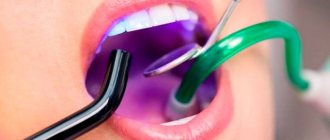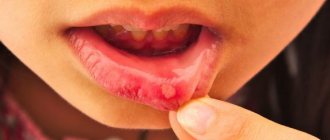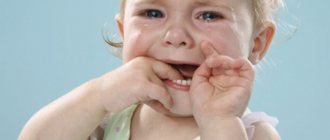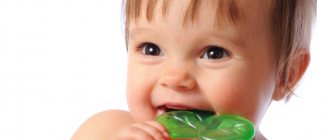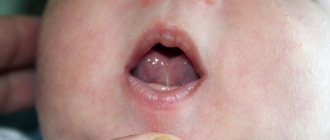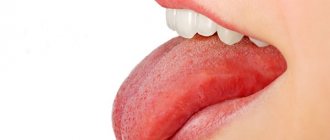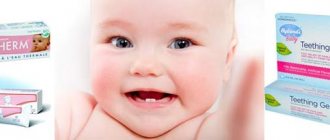To the patient about herpes. "Cold" on the lips
Authors : Kokotkin I.Yu.
General information Herpes on the lips has several names: “cold” on the lips, fever on the lips, herpes of the lips, herpes labialis, labial or labial herpes.
Cold sores on the lips are predominantly caused by herpes simplex virus type I (HSV-I) . 95% of people have this virus in their bodies. In rare cases, the cause of herpes lips is the herpes simplex virus type 2 (transmitted through oral sex).
The herpes simplex virus, which causes colds on the lips, remains inside the human body for life. At the moment, no drugs or treatment methods have been developed that would completely destroy the herpes simplex virus in the human body.
Up to 10,000,000 Russians suffer from “colds” on the lips every year. Approximately every 5 Russians get herpes of the lips from 2 to 10 times a year. And only about 5% of the human race has immunity to HSV-I, the reasons for which are still unclear.
The virus enters the body in early childhood: at 3–4 years, when the antibodies against the herpes virus transmitted to the baby by the mother are depleted. Most often, infection occurs if a child is kissed by carriers of the infection. For example, parents, brothers, sisters and other relatives. In addition to a kiss, the virus can enter the body along with the biological fluids of others, for example, saliva. When it comes to “visit” us, it penetrates the mucous membranes and reaches the nerve endings. Along them, with a flow of fluid that feeds the nerves, it rises into the cranial cavity, where it “hides” in a nerve plexus called the trigeminal ganglion and “sleeps” there until it is reactivated.
Reactivation of the virus is possible at the moment when immunity “decreases.” A “lowered” immune system can occur due to: colds, flu, menstruation, emotional distress and stress, strong ultraviolet radiation, excessive alcohol consumption, upset stomach and fatigue.
Causes of recurrence of herpes on the lips: - Stress or emotional distress; — Various somatic diseases, in particular colds, flu, diabetes, HIV; — Poisoning or intoxication; - Drinking alcohol, caffeine and smoking; — Excessive ultraviolet irradiation; — Hypothermia or overheating; - Arrival of menstruation; — Overwork and exhaustion; — Inadequate nutrition/diet or stomach upset; — Other factors individual for each person;
After “awakening”, the virus is sent back to the skin by the nerves (like a train on rails) extending from the trigeminal ganglion. It is important to know that the trigeminal plexus gives off branches that innervate the lips, oral mucosa, gums, skin on the earlobe and part of the cheek. Lesions on the skin will be located in accordance with the exiting nerves. As the virus travels through a nerve, it causes inflammation of the nerve tissue, which causes pain along the nerve fiber.
Stages of development of a “cold” on the lips
In its development, the disease passes through stage IV:
Stage I - pinching. This is when most people feel like they are getting sick. Before a “cold” appears, the skin in the corners of the mouth or the inner surface of the lips, or on the tongue, or even all over the face begins to itch. In the place where a relapse of herpes will soon develop, harbingers of the disease appear: pain, tingling, tingling, itching. The skin over the site of future relapse turns red.
The development of the disease can be prevented if acyclovir-based drugs (Zovirax ointment) are used at this stage. If you are experiencing severe itching, you can take an aspirin or paracetamol tablet.
Stage II - the stage of inflammation, begins with a small painful vesicle, which gradually increases in size. The bubble is tense and filled with a clear liquid, which later becomes cloudy.
Stage III is the stage of ulceration. The bubble bursts and a colorless liquid oozes out, filled with billions of viral particles. An ulcer forms in its place.
At this moment, the sick person is very contagious, as he releases a huge amount of viral particles into the environment. Because of the soreness and ulcers on the face, this stage bothers people the most.
IV stage of scab formation. A crust forms over the ulcers, and if damaged, it can cause pain and bleeding.
Herpes rashes are most often located on the red border of the lips, but can also be on the nose, on the cheeks, in the ears, on the forehead, in the oral cavity: on the gums, the inner surface of the lips and cheeks.
Complications of a cold on the lips
If personal hygiene rules are not followed, the virus can also affect other parts of the body: if you rub your eyes with your hands after touching blisters or sores, you can provoke ophthalmoherpes or ocular herpes - a severe eye infection, sometimes leading to decreased vision and even blindness. Herpetic eczema may develop - infection of the skin of the fingers by the virus.
If you kiss someone with ulcerated lips, you can pass the infection to a child or loved ones. Oral sex with a partner with an active “cold” on the lips can lead to “ genital herpes .” Those. during an outbreak of a “cold” on the lips, herpes can be mechanically transferred from the lips of a sexual partner “active” in oral sex to the genitals of the recipient of oral sex.
Here is how patient M. describes the severe course of a herpetic infection on the lips:
“In childhood, there were frequent rashes on the lips, but now they mainly appear on the nasal mucosa or in the form of stomatitis. You can’t treat stomatitis, but it stays stable for a week. Headaches and intoxication are very disturbing; as a rule, out of the blue, symptoms of severe poisoning appear. Tablets for the “head” help with difficulty, but an injection of analgin with diphenhydramine more or less helps. Not a single doctor even wanted to hear about headaches.”
In people with reduced immunity (immunosuppression, HIV infection), necrotic forms of the course with the formation of scars on the skin are possible.
Advice for people with colds on their lips
— Strictly follow the rules of personal hygiene . The “cold” is contagious! Always wash your hands with soap and water before and after touching cold sores, including after applying antiviral cream. - Don't touch your eyes! Especially women while applying makeup; — Do not use saliva to wet contact lenses. - Despite the itching and pain, you should not touch the rash, kiss, especially with children, use someone else’s lipstick or borrow your own, smoke one cigarette with a friend. — Do not try to remove blisters and scabs to avoid transmitting the infection to other parts of the body or causing a bacterial infection. - Stop having oral sex! Oral sex during a “cold” on the lips of an “active” partner can cause genital herpes in a partner passively participating in oral sex. In this case, herpes from the lips of the “active” partner can be transferred to the genitals of the partner receiving caresses. - If you have a cold on your lips, use individual dishes or a towel, do not drink from other people's glasses... Caring for a newborn. To avoid infecting a newborn with herpes, women who have herpetic rashes on the lips should wash their hands thoroughly before touching the baby. If there are blisters or sores on the lips, a disposable surgical mask or gauze bandage should be used while caring for the child until the sores dry out. When you have a cold on your lips, you should not kiss or smell your baby. If there is herpes on any other part of the body, then it should be carefully covered and under no circumstances come into contact with the child’s skin.
REMEMBER: - When you feel a tingling sensation, the effect of the virus has already begun, which means it’s time, without delay, to start using antiviral cream or other antiviral drugs prescribed by your doctor; - Use your medicine! Medicines will help stop the development of a relapse or speed up recovery. Use acyclovir-based creams and ointments, which will help the blisters and ulcers heal quickly, and nutritional supplements containing either zinc, L-LYSINE, or hydroxytoluene. Remember that the use of corticosteroids (hydrocortisone ointment) reduces itching, but sharply increases the area and severity of the lesions and the duration of the painful period. — Apply antiviral ointments with cosmetic sticks. To apply antiviral ointments (Acyclovir, Zovirax) to herpetic rashes, use special cosmetic sticks, as shown in this figure.
Applying ointments to the affected area directly with your fingers can lead to the virus being transferred from the lips to the skin of the fingers. — If you have frequent relapses, then make sure that you always have the medicine at hand. Like a passport or money, always keep it with you;
— Acyclovir-based creams and ointments should be used at least 4 times a day for 5 days. — As prescribed by a doctor, valacyclovir can be prescribed for one-day treatment of herpes of the lips. If you take two tablets of valaciclovir 500 mg, first in the morning and then in the evening, within 24 hours from the onset of the disease, then a cold on the lips will not develop or the healing of herpetic lesions will occur faster.
— If the “cold” does not go away within 10 days, be sure to consult a dermatologist, since a “cold” on the lips can be a symptom of other serious diseases that require specialized treatment.
— A long-term course of colds on the lips (more than 30 days) may be a sign of a sharp decrease in immunity, benign tumors and oncological diseases, HIV infection, and lymphoproliferative diseases.
Author: Ivan Yurievich Kokotkin, doctor
Source: https://www.herpes.ru/
